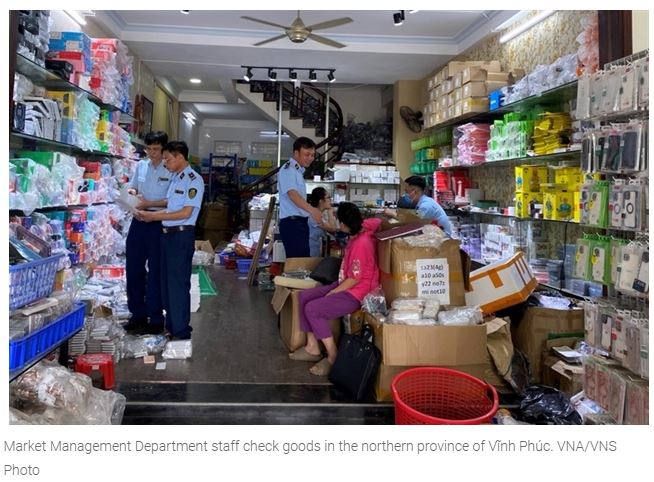Vietnam: Consumers, businesses urged to join fight against counterfeit goods online
Consumers and businesses are called on to join authorities to curb counterfeit, fake, and smuggled goods on online shopping platforms, particularly as e-commerce has been thriving strongly in Việt Nam.
HÀ NỘI — Consumers and businesses are called on to join authorities in the fight against counterfeit, fake, and smuggled goods on online shopping platforms.
The issue has been receiving more attention due to the booming popularity of e-commerce in Việt Nam.
Statistics from the Việt Nam E-commerce Association (VECOM) show that in 2021, Việt Nam’s retail e-commerce market size reached US$13.5-13.7 billion. In 2022, the figure increased to $16.4 billion and is forecast to reach about $38 – 39 billion by 2025.
According to experts, the buying trend of consumers has changed rapidly in the past three years due to the COVID-19 pandemic, from consumer goods, food, drinks, fashion, and cosmetics.
However, according to preliminary statistics from the Ministry of Industry and Trade (MoIT), authorities receive about 1,500 complaints via hotlines and written documents related to online shopping each year.
Trần Hữu Linh, Director General of the MoIT’s General Department of Market Management, said that last year, the market management force nationwide inspected 774 cases relating to e-commerce, detected 439 violations, and collected total fines of nearly VNĐ5.9 billion (over $250,000).
“This is still quite a modest number,” he said.
According to Nguyễn Thị Minh Huyền, Deputy Director of the MoIT’s E-Commerce and Digital Economy Authority, violations in conventional trade all appear in e-commerce. Moreover, it’s easier to conduct violations online, while it’s much more difficult to detect and handle them because sellers don’t set up physical warehouses and stores, or goods are stored in many places, and they only accept online orders.
Moreover, online stores are easily created and closed in a short time. The product information posted online may be real, but the product delivered to buyers can be fake, she said.
Nguyễn Đức Lê, Deputy Director of the Operations Department, General Department of Market Management, said that acts of trading counterfeit smuggled goods, those infringing intellectual property rights, and goods of unknown origin were increasingly sophisticated and occurred more often online.
E-commerce activities are based on technology infrastructure, so during inspections, violators can hide and delete pieces of evidence quickly, making it difficult for law enforcement, according to the official.
In addition, for transactions on social networks, it is very difficult to prove them as commercial transactions as sellers and buyers use personal accounts to contact each other and pay online too.
Nguyễn Hữu Tuấn, Head of the Department of E-commerce Management under MoIT’s E-Commerce and Digital Economy Authority, said that in many cases, consumers knew that the goods were fake or of unknown origin, but still bought or did not denounce them. Meanwhile, many businesses had not paid attention to anti-counterfeiting and brand protection.
Deputy Director of the MoIT’s E-Commerce and Digital Economy Authority Huyền said that to strengthen the control over online counterfeit goods and promote the development of e-commerce, it was necessary to review and perfect relevant legal frameworks and increase public legal understanding, especially for traders, organisations and individuals.
“It’s also a must to increase the responsibility of e-commerce platforms and social networking sites in screening and preventing accounts that do not provide sufficient information, and accounts with signs of infringing goods,” she said.
Moreover, the agency had planned to offer training for businesses and owners of protected trademarks to create a favourable mechanism for complaint settlement, verifying infringing goods as well as strengthening coordination among relevant agencies. — VNS


 English
English




